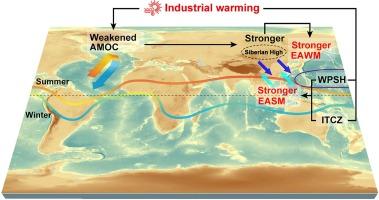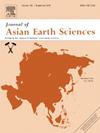Industrially induced warming triggered synchronous intensity changes in the East Asian summer and winter monsoons
IF 2.7
3区 地球科学
Q2 GEOSCIENCES, MULTIDISCIPLINARY
引用次数: 0
Abstract
Anomalies in the East Asian monsoon system significantly disrupt the densely populated East Asian region, underscoring the importance of understanding such changes and improving current predictive abilities. On the basis of instrumental records, previous studies have shown that the East Asian winter monsoon (EAWM) and summer monsoon (EASM) interact with each other. However, owing to the lack of long-term high-resolution EAWM records, it remains unclear how and whether human activity has affected the phase relationship between the EASM and EAWM since the Industrial Revolution. In this study, we present a precisely dated high-resolution EAWM record for the last 300 years from a crater lake in northeastern China. Our results indicate that the EAWM intensity was relatively weak and fluctuated significantly between 1700 and 1850 CE. After 1850 CE, the EAWM strengthened rapidly and exceeded its intensity observed at the end of the Little Ice Age. In addition, a comparison of our reconstructed EAWM record with the published EASM record clearly shows in-phase variations during the Current Warm Period. We concluded that the climatic effects of industrially induced warming enhance the EAWM by slowing the Atlantic meridional overturning circulation and increasing the meridional temperature gradient, while also strengthening the EASM by increasing hemispheric meridional gradients and affecting other large-scale processes. Under the sustained intensification of human activity, the EASM and EAWM are likely to continue exhibiting synchronous variations in the future.

工业导致的气候变暖引发了东亚夏季和冬季季风强度的同步变化
东亚季风系统的异常现象极大地扰乱了人口稠密的东亚地区,这凸显了了解这种变化并提高当前预测能力的重要性。根据仪器记录,以往的研究表明东亚冬季季候风和夏季季候风相互影响。然而,由于缺乏长期的高分辨率东亚冬季季候风记录,自工业革命以来,人类活动如何以及是否影响了东亚冬季季候风和夏季季候风之间的相位关系仍不清楚。在本研究中,我们从中国东北部的一个陨石坑湖中获得了过去 300 年中精确测定日期的高分辨率 EAWM 记录。我们的研究结果表明,在公元 1700 年至 1850 年期间,EAWM 强度相对较弱,且波动明显。西元 1850 年后,EAWM 迅速增强,并超过了小冰河时期末期观测到的强度。此外,将我们重建的 EAWM 记录与已公布的 EASM 记录进行比较,可以清楚地看到当前暖期的同相变化。我们得出的结论是,工业引起的气候变暖通过减缓大西洋经向翻转环流和增加经向温度梯度来增强 EAWM,同时也通过增加半球经向梯度和影响其他大尺度过程来加强 EASM。在人类活动持续加剧的情况下,EASM 和 EAWM 在未来可能会继续呈现同步变化。
本文章由计算机程序翻译,如有差异,请以英文原文为准。
求助全文
约1分钟内获得全文
求助全文
来源期刊

Journal of Asian Earth Sciences
地学-地球科学综合
CiteScore
5.90
自引率
10.00%
发文量
324
审稿时长
71 days
期刊介绍:
Journal of Asian Earth Sciences has an open access mirror journal Journal of Asian Earth Sciences: X, sharing the same aims and scope, editorial team, submission system and rigorous peer review.
The Journal of Asian Earth Sciences is an international interdisciplinary journal devoted to all aspects of research related to the solid Earth Sciences of Asia. The Journal publishes high quality, peer-reviewed scientific papers on the regional geology, tectonics, geochemistry and geophysics of Asia. It will be devoted primarily to research papers but short communications relating to new developments of broad interest, reviews and book reviews will also be included. Papers must have international appeal and should present work of more than local significance.
The scope includes deep processes of the Asian continent and its adjacent oceans; seismology and earthquakes; orogeny, magmatism, metamorphism and volcanism; growth, deformation and destruction of the Asian crust; crust-mantle interaction; evolution of life (early life, biostratigraphy, biogeography and mass-extinction); fluids, fluxes and reservoirs of mineral and energy resources; surface processes (weathering, erosion, transport and deposition of sediments) and resulting geomorphology; and the response of the Earth to global climate change as viewed within the Asian continent and surrounding oceans.
 求助内容:
求助内容: 应助结果提醒方式:
应助结果提醒方式:


